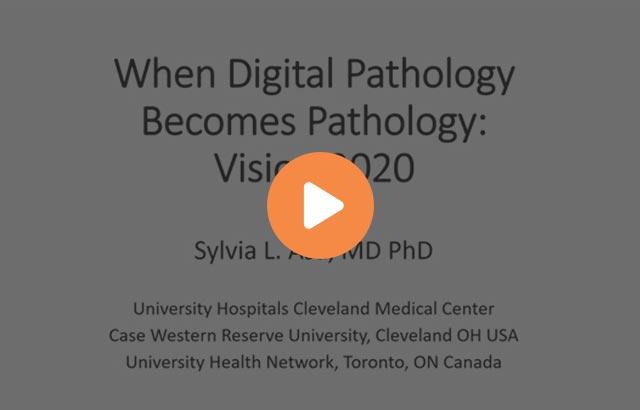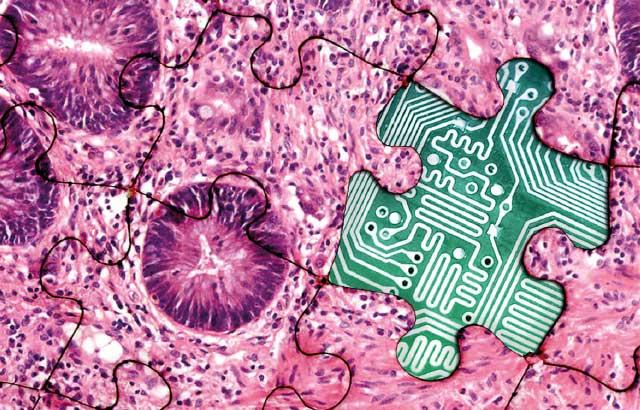
Digital Pathology ROI Paradox and ‘the Genius of AND’

In the widely-respected book Built to Last, researcher Jim Collins observed perennially successful organizations exhibited common traits, including the ability to “...preserve a passionately held core ideology and simultaneously stimulate progress in everything but that ideology. Preserve the core and stimulate progress. A truly visionary company embraces both ends of a continuum: continuity and change, conservatism and progressiveness, stability and revolution, predictability and chaos, heritage and renewal, fundamentals and craziness. And, and, and.“ Collins dubbed it ‘the Genius of the AND’.
I couldn’t agree more. The Genius of the AND should be a central principle in pathology’s digital transformation, especially in regard to return on investment (ROI). To bring digital into daily practice we need rigor and transparency as to how we recoup the investment in digital pathology, and this requires defining ROI with confidence and specificity.
Recently I participated in a panel to examine the digital transformation of pathology labs and practices, along with Dr.Kyoung Bun Lee and Dr. Rajesh Dash. We had a wide-ranging conversation exploring topics including global policies and standards, real-world considerations when adopting digital, and ROI paradigms. The relevance of ‘the Genius of the AND’ to ROI was evident throughout our conversation, which included these powerful ANDs:
- Pathologists and non-pathologists. Digital transformation engages different, often new, stakeholders such as IT and enterprise-level executives. We must evolve the pathology community into an expanded pathology ecosystem that recognizes the importance of metrics that include traditional pathology-focused measures as well as measures that reflect the priorities of IT or hospital executives. For example, workflow efficiency ROI measures can be crafted to consider technology interoperability across different IT systems. Electronic health records, laboratory information systems, pathology PACS, hardware and others in the ecosystem need to work together to fulfill pathology and hospital requirements ultimately improving patient care.
- Manual and automated. There is a paradox inherent in our need to expend more manual time and effort at the outset of digital to yield the long-term benefits of automated technologies. Meaningful ROI measures will reflect this reality.
- Glass slides and digital images. Most future visions of pathology maintain the glass slide in concert with digital. This duality compels us to contemplate ROI that considers multiple image modalities, including gross imaging and whole slide imaging. We should also get curious regarding the additive ROI possible when AI/ML is layered on to digitally-driven pathology.
- Patient-care centered and value-focused. At ProPath, we believe putting patients first and providing economic value are synergistic aspirations. Our spectrum of ROI measures reflects this philosophy, balancing clinical measures (e.g., technical-only immunohistochemistry stains) and operational measures (e.g., reduced shipping costs for slides, quicker consults; report turn-around time).
- Quantified impact and immeasurable benefits: A thorough ROI analysis will be inclusive, acknowledging the benefits of digital even when those benefits are hard to quantify. Consider “softer” metrics that are clinical (e.g., patient-centered care); operational (e.g., equity, access) and team focused (better pathologist work satisfaction).
While some pathologists are wary of “going digital”, I’m of the mindset that digital is nothing to fear. Rather, it is something to embrace.
About the presenter

Dr. Roberts is a board-certified clinical and anatomic pathologist sub-specializing in gastrointestinal and hepatic pathology and President of the Anatomic Pathology Division Sonic Healthcare USA.
Dr. Roberts was formerly with ProPath as the President and Chairman of the Board since 2011, led the company through a successful re-organization in 2016, and was named as its first Chief Executive Officer in 2017.
Dr. Roberts also serves on the Scientific Advisory Board at Reveal Biosciences, the Gastroenterology Expert Panel at Allakos, the Thought Leadership Initiative at Leica Biosystems, the Board of Directors of Morningside University, a panelist on the Panel of National Pathology Leaders, and has served as a laboratory industry consultant for Glenview Capital Management. Prior to joining ProPath, he was an Assistant Professor of Pathology and Director of the Residency Program at the University of Nebraska Medical Center.
Related Content
Leica Biosystems Knowledge Pathway content is subject to the Leica Biosystems website terms of use, available at: Legal Notice. The content, including webinars, training presentations and related materials is intended to provide general information regarding particular subjects of interest to health care professionals and is not intended to be, and should not be construed as, medical, regulatory or legal advice. The views and opinions expressed in any third-party content reflect the personal views and opinions of the speaker(s)/author(s) and do not necessarily represent or reflect the views or opinions of Leica Biosystems, its employees or agents. Any links contained in the content which provides access to third party resources or content is provided for convenience only.
For the use of any product, the applicable product documentation, including information guides, inserts and operation manuals should be consulted.
Copyright © 2025 Leica Biosystems division of Leica Microsystems, Inc. and its Leica Biosystems affiliates. All rights reserved. LEICA and the Leica Logo are registered trademarks of Leica Microsystems IR GmbH.



